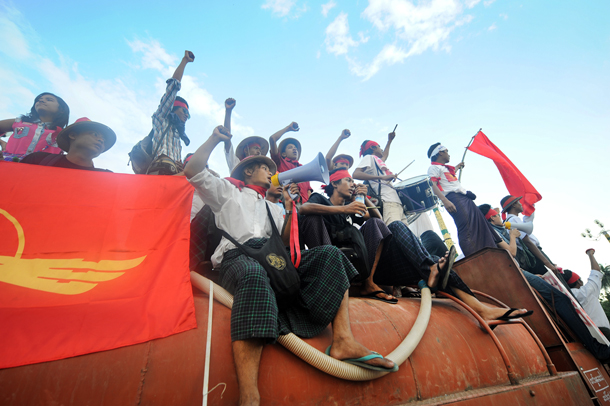In the Face of Government Intransigence, Burma’s Students March On
By Burma Partnership • February 2, 2015In Burma Partnership’s 2014 end-of-year review, we identified the role of student unions in Burma’s political affairs as one of the more notable and inspiring developments of 2014: “Burma’s students were always at the center of major democracy movements throughout history – most notably in 1988 – and have now made a comeback.” Furthermore, we declared that “it is the students that represent the greatest hope for the people of Burma – and the greatest threat to the Burma Government. It is vital that their progressive voice continues to be heard.” Indeed, these forecasts have been borne out, as January 2015 has seen the student movement go from strength to strength.
The underlying catalyst for this burgeoning student movement – and wider public support for it – is the overwhelming conclusion that Burma’s so-called reforms have now hit crisis point. Objections started with more “big picture” accusations that the political reforms initiated in 2011 have proven to be fake, accusations that are now crystallizing into fears that the national elections slated for later this year will be fixed, postponed or cancelled. More recently, students have honed in on specific issues, most notably education reform, land rights abuses, and violent responses to peaceful protests on the part of the authorities.
On 13 January, Action Committee for Non-violence and Justice, a working group of diverse youth organizations and networks, released this statement expressing their support for the students’ boycott of the notorious National Education Law (NEL) in connection with the broader issue of education sector reform. Above all, they have called for meaningful dialogue between students, the Network for National Education Reform (NNER), the Burma Government and Parliament, and for all parties to refrain from violence. Then, on 23 January, 63 civil society organizations released a statement fully supporting the students’ demands for amendment of the NEL, stating that “education sector reform during [the] transition period is very important and vital for the future of [Burma].” They also underscore the pressing need for dialogue, resolution and non-violence at this tense time.
On 24 January, following the expiry of the 60-day deadline for negotiation with the authorities, the main student representative body, Action Committee for Democratic Education (ACDE), released this statement highlighting 11 priority points for negotiation. ACDE comprises the All Burma Federation of Student Unions and University Student Unions, and was established during the nationwide student emergency conference convened on 12-13 November 2014 and attended by more than 500 students. At the conference, ACDE strongly condemned the NEL, which had been approved by the Burma Government and Parliament, and unanimously agreed to boycott it. The students demanded that the Burma Government initiate negotiations within 60 days and also include the Burma Parliament and the NNER in quadripartite talks.
After encountering various obstacles and obstructions, student representatives met government officials in Naypyidaw on 28 January and signed an agreement committing to these quadripartite talks. The talks regarding certain key preconditions for negotiating the 11 priority points were then held on 1 February in Rangoon. However the Burma Government did not agree to these preconditions, including refraining from taking legal action against the protesters and their supporters.
Meanwhile, the authorities have employed various methods of intimidation and harassment against the students and their supporters, including: (1) pressuring local monasteries not to accommodate the students as they pass through on their protest marches; (2) infiltrating marches and attempting to instigate violence from within; (3) temporarily detaining local supporters; and (4) physically attacking local supporters by throwing stones.
The students have resumed their protest marches however, while continuing to receive overwhelming support from local residents along the road, expressing their fundamental rights to freedom of expression, assembly and association, despite constant and explicit threats of arrest and violence. As in Hong Kong, government intransigence is being met with principled, determined and brave activism, as people find their voice and the courage to demand the democratic values and rights to which they are entitled under international law.
As stated most eloquently by the Coordination Committee of Myanmar Civil Society Organization Forum in their 30 January statement: “We strongly urge the international community, especially international governments and international non-governmental organizations operating in education and youth sectors providing either financial and/or technical assistances for education sector reform, to ensure that their assistances genuinely and effectively support the [NEL]’s compliance with democracy and human rights principles.”
The negotiations continued on 1-2 February, yet as of 3 February the Burma Government has postponed further discussions without any agreement until after Union Day on 12 February. The students are, and should be, the primary stakeholder of education reform. We stand with them and urge the Burma Government to take genuine steps towards meaningful dialogue. The international community – and particularly the donors of education sector reform – must recognize the legitimacy of the students’ movement and ensure that their voices are the foundation for the promotion of democracy in Burma.
Burma Partnership’s website now features updates from the student protests. Access the page here
Tags: Burma Partnership, National Education Law, Peaceful ProtestThis post is in: Blog
Related PostsBurma Partnership Celebrates Continuing Regional Solidarity for Burma and Embraces the Work Ahead for Progressive Voice
Burma Army Displays Blatant Disregard for 21st Century Panglong Peace Process
Ann Din Coal Power Plant: Local Movement and Action to Preserve and Protect Natural Resources and Land: Mon IDP Report Case Study #4
Latest Human Rights Abuse Case Demonstrates Urgent Need to Reform the Myanmar National Human Rights Commission
Human Rights Far From Guaranteed as US Sanctions on Burma Are Removed










 All posts
All posts